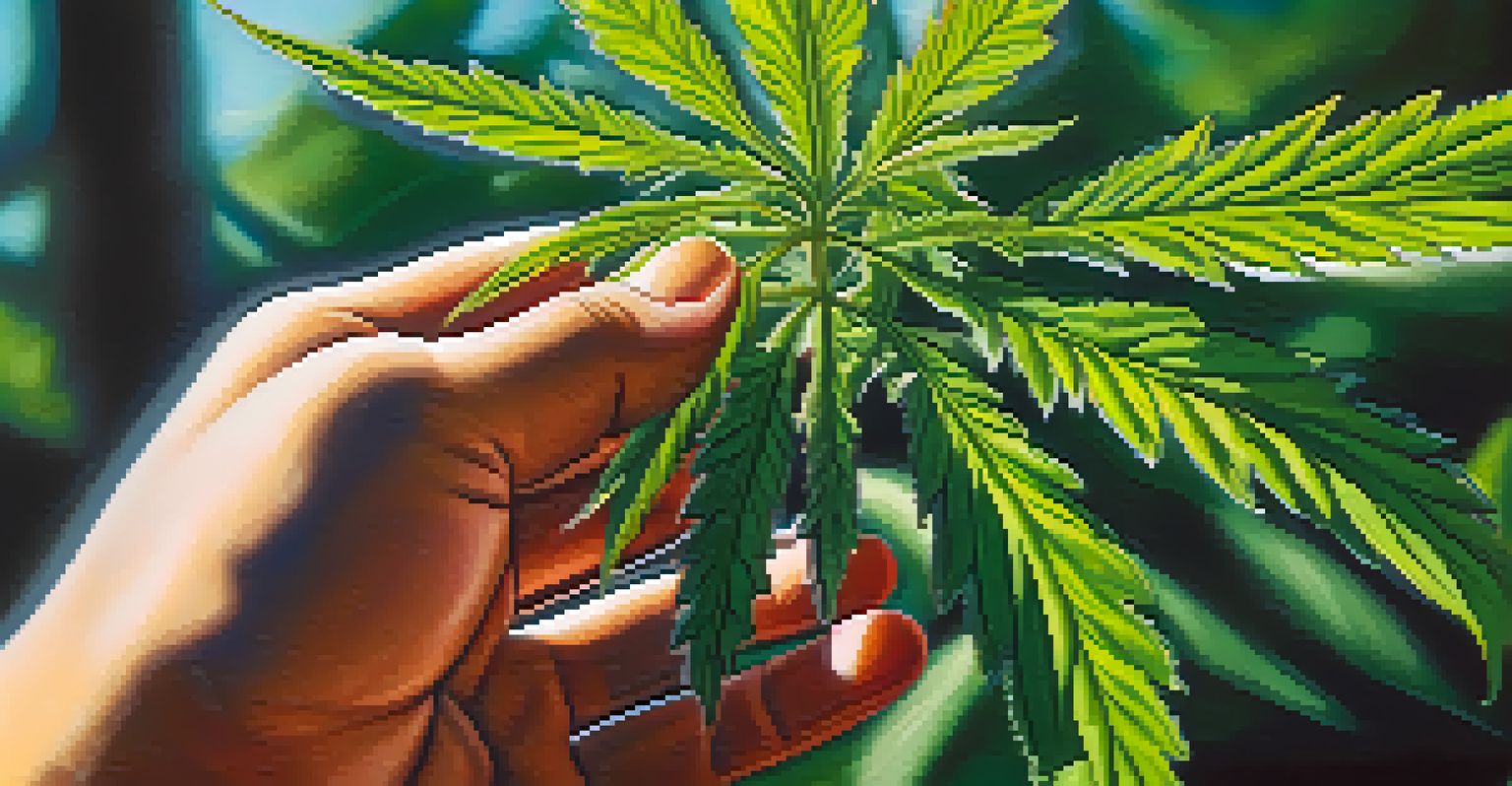Generational Differences in Marijuana Attitudes Explored

Understanding Generational Attitudes Towards Marijuana
Marijuana has evolved from a taboo substance to a widely accepted one, but attitudes vary significantly across generations. For instance, Baby Boomers, who were young during the 1960s counterculture movement, often have a more relaxed view of cannabis use. In contrast, Generation Z, having grown up in a world where marijuana legalization is more common, tends to see it as a normal part of life. This generational shift reflects broader changes in societal norms and values surrounding drug use.
The greatest danger in times of turbulence is not the turbulence; it is to act with yesterday's logic.
The differences can often be traced back to the unique cultural contexts each generation experienced. Baby Boomers were heavily influenced by the anti-establishment movements of their youth, which championed marijuana as a symbol of rebellion. On the other hand, Millennials and Gen Z have been exposed to extensive research and discussions about the medicinal benefits of marijuana, leading to a more nuanced understanding. This backdrop helps explain why younger generations are more likely to support legalization.
Moreover, the legalization of cannabis in many states has made it more accessible and socially acceptable. This shift has contributed to a growing acceptance among younger generations, who view marijuana not just as a recreational substance but also as a potential therapeutic option. As attitudes continue to evolve, it’s essential to recognize how these generational differences shape the ongoing conversation around marijuana.
The Impact of Legalization on Generational Views
Legalization has played a pivotal role in shaping how different generations perceive marijuana. For older generations, legalization may evoke memories of past stigmas and fears associated with drug use. In contrast, younger individuals often see legalization as an opportunity for health benefits and economic growth. This shift in perspective is crucial for understanding the broader acceptance of marijuana in society today.

Younger generations are more inclined to view cannabis as a legitimate industry, complete with potential for entrepreneurship and job creation. They see the development of cannabis businesses as part of a new economic landscape, unlike older generations who may still associate marijuana with illegal activity. This generational divide in perception can lead to varied opinions on policies related to marijuana regulation and taxation.
Generational Views on Legalization
Younger generations see marijuana legalization as an opportunity for health benefits and economic growth, while older generations often recall past stigmas.
Interestingly, the impact of legalization also extends to social attitudes and peer influences. Younger people, who are more likely to engage in discussions about marijuana, often normalize its use within their social circles. As marijuana becomes woven into the fabric of contemporary society, the generational gap in attitudes is likely to continue narrowing, fostering a more unified perspective on cannabis.
Health Perspectives on Marijuana Across Generations
Health considerations play a significant role in how different generations view marijuana. For older generations, concerns about the potential negative health effects often outweigh perceived benefits. In contrast, younger individuals are generally more accepting of marijuana's medicinal uses, seeing it as a natural alternative to traditional pharmaceuticals. This difference in perception highlights the evolving narrative around cannabis and health.
Education is the most powerful weapon which you can use to change the world.
Research has increasingly shown the therapeutic benefits of marijuana for various conditions, which resonates strongly with Millennials and Gen Z. They are more likely to advocate for its use in managing pain, anxiety, and other health issues. This generational shift is prompting discussions about the importance of educating people on responsible use and the potential benefits of cannabis, helping to dispel long-held myths.
Moreover, as public health campaigns continue to promote awareness about safe marijuana use, younger generations are embracing this information. They are more likely to seek out knowledge about strains, dosages, and consumption methods. This proactive approach to understanding marijuana reflects a broader trend towards prioritizing personal health and wellness in a way that older generations may not have experienced.
Cultural Influences on Marijuana Attitudes
Cultural narratives surrounding marijuana have shifted dramatically over the decades, influencing generational attitudes. For Baby Boomers, the portrayal of marijuana in media often leaned towards the negative, emphasizing its dangers. In contrast, contemporary media representations often celebrate cannabis culture, showcasing its various uses and benefits. These cultural depictions play a critical role in shaping perceptions across different generations.
The rise of social media has also transformed how marijuana is discussed and perceived. Platforms like Instagram and TikTok feature influencers advocating for cannabis use, creating a more favorable image that resonates with younger audiences. This visibility helps normalize marijuana, making it more acceptable for younger generations while reinforcing their more positive attitudes towards its use.
Health Perspectives Evolve
Younger individuals tend to embrace marijuana's medicinal uses, advocating for its benefits, unlike older generations who focus on potential health risks.
Additionally, music and arts have long been intertwined with marijuana culture, acting as a vehicle for generational expression. Many artists from the Baby Boomer era used marijuana as a form of rebellion, while today’s artists often promote it as part of a lifestyle choice. This evolution in cultural representation continues to shape how different generations perceive marijuana, further driving acceptance among younger populations.
The Role of Education in Shaping Attitudes
Education around marijuana has transformed significantly over the years, impacting generational attitudes. Older generations often lacked access to comprehensive information about cannabis, leading to misconceptions and stigma. In contrast, today’s youth benefit from a wealth of resources that discuss both the risks and benefits of marijuana use. This access to information empowers younger generations to make informed choices about cannabis.
School programs and public health initiatives now frequently include education about marijuana, addressing its effects and legality. These efforts aim to promote responsible use while dispelling myths, ultimately shaping a more balanced perspective among younger people. As educational resources continue to expand, the generational gap in understanding marijuana is likely to diminish.
Moreover, discussions around marijuana in academic settings provide a platform for critical thinking and dialogue. Students today are encouraged to engage in conversations about drug policy, health implications, and social justice issues related to marijuana use. This open discourse fosters a more informed and accepting attitude towards cannabis among younger generations, reinforcing their progressive stance.
Social Circles and Their Influence on Marijuana Attitudes
Social circles play a vital role in shaping attitudes towards marijuana across generations. For older individuals, peer pressure may have been a deterrent against marijuana use, often reinforced by societal norms. However, for younger generations, social circles can serve as support systems that normalize and encourage cannabis use. This shift reflects broader changes in societal attitudes towards marijuana.
The influence of friends and family can significantly impact one's views on marijuana. In many cases, Millennials and Gen Z report that their friends are more accepting of cannabis use, leading to a more relaxed attitude toward trying it themselves. As acceptance grows within social circles, individuals may feel more comfortable exploring marijuana as a recreational or therapeutic option.
Cultural Narratives Shape Attitudes
Cultural representations and social media have shifted, normalizing marijuana use and influencing younger generations to adopt more positive attitudes.
Additionally, social media has transformed how these influences manifest. Online communities dedicated to cannabis culture allow younger generations to connect, share experiences, and advocate for legalization. This interconnectedness fosters a sense of belonging and acceptance, further solidifying the more progressive attitudes towards marijuana among younger people.
The Future of Marijuana Attitudes Across Generations
As societal norms continue to evolve, the future of marijuana attitudes appears to be leaning towards greater acceptance across all generations. Younger generations are already demonstrating more open-minded views, while older generations are gradually reassessing their perceptions in light of new information and changing laws. This gradual shift suggests that the stigma surrounding marijuana is likely to diminish over time.
Advancements in research and advocacy efforts are also paving the way for a more informed perspective on marijuana. As more studies highlight its potential benefits, older generations may become more receptive to the idea of responsible use. This collaborative approach could lead to a more unified stance on cannabis, transcending generational divides.

Ultimately, the trajectory of marijuana attitudes will depend on ongoing education, open dialogue, and cultural shifts. As discussions surrounding cannabis continue to grow, we may find that the generational differences in attitudes become less pronounced, fostering a more inclusive and accepting view of marijuana in society.